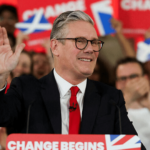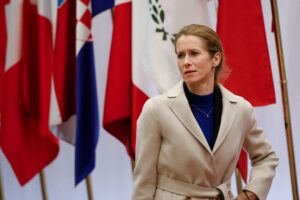Moment of celebration turns bittersweet as Hungary carries through on threats to block financial aid for Kyiv.
President Volodymyr Zelenskyy has hailed a “victory” for Ukraine and Europe after European Union leaders agreed to open membership talks with Kyiv, but the mood was soured just hours later when Hungary carried through on threats to block crucial financial aid to Ukraine.
European Council President Charles Michel, host of the summit in Brussels, announced Thursday’s agreement on membership talks in a social media post, calling it “a clear signal of hope for their people and for our continent”.
Zelenskyy welcomed the decision as “a victory for Ukraine. A victory for all of Europe. A victory that motivates, inspires, and strengthens,” he said in a post on X.
European Commission chief Ursula von der Leyen said it was “a strategic decision and a day that will remain engraved in the history of our union”.
“These countries belong to the European family,” German Chancellor Olaf Scholz said.
The EU also agreed to open talks with Moldova and granted EU candidate status to Georgia. Michel said the block would also advance a membership bid by another hopeful – Bosnia and Herzegovina – once it reaches “the necessary degree of compliance” with criteria.
Hungary blocks funding
But the mood changed early on Friday when Hungary’s prime minister, Viktor Orban, a close ally of Russian President Vladimir Putin, announced he had blocked a proposal to revamp the EU budget to include 50 billion euros ($54bn) in financial aid to Kyiv as it battles to remove Russian troops from its territory.
For weeks, Orban had been promising to block the membership deal and the funding, which he said were not in the interests of Hungary or the EU.
While Orban had agreed not to be in the room for the membership vote – allowing it to pass – the other EU nations were unable to overcome his resistance to the budget proposal put forward by Michel.
“We still have some time. Ukraine is not out of money in the next few weeks,” Dutch Prime Minister Mark Rutte told reporters on leaving the talks. “I am fairly confident we can get a deal early next year, we are thinking of late January.”
However, on Friday, Orban told Hungarians in an interview on state radio that Budapest could yet put a stop to Ukraine’s membership talks and he will not give a nod to the funding package unless Brussels releases billions of euros to Hungary that it has frozen due to rule of law concerns.
It is widely believed that Orban has been complicating the EU’s efforts to help Ukraine not only because he is close to Putin but also as a way to force Brussels to release the frozen funds, which total more than 30 billion euros ($32.8bn).
Stressing that membership talks would be long and complex, the Hungarian leader slammed the “bad decision” to invite Ukraine to launch the process.
“Hungary bears no responsibility for this. We can halt this process later on, and if needed, we will pull the brakes, and the ultimate decision will be made by the Hungarian parliament,” he said.
He also appeared to set out a clear quid pro quo regarding the funding.
“I’ve always said that if someone wants to amend the budget law and they want to for several reasons, this is a great opportunity for Hungary to make it clear that it should get what it deserves – not half, then a quarter, but it must get the whole thing,” Orban said.
While insisting that Hungary is not a pro-Russian country, the Kremlin on Friday praised Budapest for being prepared to defend its own interests.
Kremlin spokesperson Dmitry Peskov warned that Ukraine and Moldova could “destabilise” the EU should they join.
“Negotiations to join the EU can last for years or decades. The EU has always had strict criteria for accession, and it is obvious that at the moment neither Ukraine nor Moldova meets these criteria,” he told reporters.
“It is clear that this is an absolutely politicised decision, the EU’s desire to demonstrate support for these countries. But such new members could destabilise the EU, and since we live on the same continent as the EU, we, of course, are closely watching this.”
Zelenskyy has been rallying allies’ support for his country as concerns grow that their backing might be waning.
This week, he travelled to the United States, where he hoped to persuade Republican lawmakers to approve billions of dollars in new funding that they have blocked in Congress.
US President Joe Biden has argued that their refusal to back the new spending plays into Putin’s hands.
‘United and ready’
Ukraine launched its bid to become part of the EU after Moscow began its full-scale invasion in February 2022 and was officially named a candidate to join in June last year.
Fellow former Soviet republic and neighbour Moldova had applied at the same time as Ukraine.
The war in Ukraine has breathed new life into the EU’s stalled push to take on new members as the bloc looks to keep Russian and Chinese influence at bay.
In June 2022, the European Commission set Kyiv seven reform benchmarks to complete, including tackling corruption and curbing the power of its oligarchs, before talks should start.
Ukrainian Prime Minister Denis Shmyhal said the EU’s decision on Thursday showed that it “highly appreciated the reforms we have made in recent years and the implementation of all the recommendations of the European Commission”.
“A difficult path lies ahead. We are united and ready,” he said.
EU treaties oblige members to help “by all means in their power” another EU country that is a victim of armed aggression on its territory. If Ukraine becomes an EU member while the war with Russia is continuing, EU countries would have to respect that.
The EU would also acquire a long new border with Russia and Belarus with implications for security, migration and defence.
Source : Aljazeera











